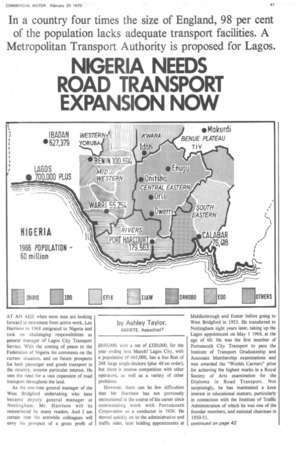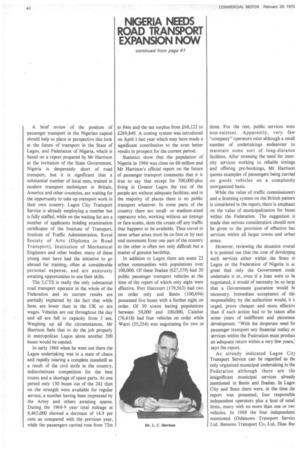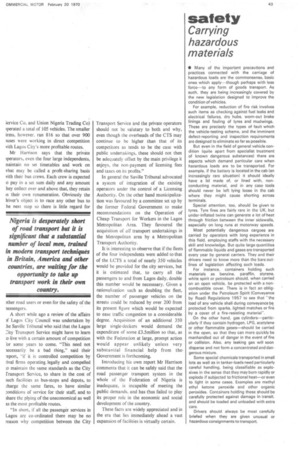by Ashley Taylor,
Page 43

Page 44

Page 45

If you've noticed an error in this article please click here to report it so we can fix it.
AM I RTE, Assocl nstT AT AN AGE when most men are looking forward to retirement from active work, Len Harrison in 1968 emigrated to Nigeria and took on challenging responsibilities as general manager of Lagos City Transport Service. With the coming of peace to the Federation of Nigeria his comments on the current situation, and on future prospects fof both passenger and goods transport in the country, assume particular interest. He sees the need for a vast expansion of road transport throughout the land.
As the one-time general manager of the West Bridgford undertaking who later became deputy general manager at Nottingham. Mr. Harrison will be remembered by many readers. And I am certain that his erstwhile colleagues will envy his prospect of a gross profit of £650,000, with a net of £.320,000, for the year ending next March! Lagos City, with a population of 665,000, has a bus fleet of 248 large single-deckers (plus 48 on order), but there is intense competition with other operators, as well as a variety of other problems.
However, there can be few difficulties that Mr Harrison has not previously encountered in the course of his career since commencing work with Portsmouth Corporation as a conductor in 1926. He moved quickly on to the administrative and traffic sides, later holding appointments at Middlesbrough and Exeter before going to West Bridgford in 1953. He transferred to Nottingham eight years later, taking up the Lagos appointment on May I 1968, at the age of 60. He was the first member of Portsmouth City Transport to pass the Institute of Transport Graduateship and Associate Membership examinations and was awarded the "Worlds Carriers" prize for achieving the highest marks in a Royal Society of Arts examination for the Diploma in Road Transport. Not surprisingly, he has maintained a keen interest in educational matters, particularly in connection with the Institute of Traffic Administration of which he was one of the founder members, and national chairman in 1950-51. A brief review of the position of passenger transport in the Nigerian capital should help to place in perspective this look at the future of transport in the State of Lagos, and Federation of Nigeria, which is based on a report prepared by Mr Harrison at the invitation of the State Government. Nigeria is desperately short of road transport, but it is significant that a substantial number of local men, trained in modern transport techniques in Britain, America and other countries, are waiting for the opportunity to take up transport work in their own country. Lagos City Transport Service is already employing a number but is fully staffed, while on the waiting list are a number of applicants holding examination certificates of the Institute of Transport, Institute of Traffic Administration, Royal Society of Arts (Diploma in Road Transport), Institution of Mechanical Engineers and other bodies, many of these young men have had the initiative to go abroad for training, often at considerable personal expense, and are anxiously awaiting opportunities to use their skills.
The LCTS is really the only substantial road transport operator in the whole of the Federation and its current results are partially explained by the fact that while fares are lower than in the UK so are wages. Vehicles are out throughout the day and 'all are full to capacity from 5 am. Weighing up all the circumstances, Mr Harrison feels that to do the job properly in metropolitan Lagos alone another 200 buses would be needed.
In early 1968 when he went out there the Lagos undertaking was in a state of chaos and rapidly nearing a complete standstill as a result of the civil strife in the country, indiscriminate competition for the best routes and a shortage of spare parts. At one period only 130 buses out of the 242 then on the strength were available for regular service, a number having been impressed by the Army and others awaiting spares. During the 1968-9 year total mileage at 8,465,000 showed a decrease of 14.9 per cent as compared with the previous year, while the passengers carried rose from 72m to 84m and the net surplus from £68,122 to £269,849. A costing system was introduced on April 1 last year which may have made a significant contribution to the even better results in prospect for the current period.
Statistics show that the population of Nigeria in 1966 was close on 60 million and Mr Harrison's official report on the future of passenger transport comments that it is true to say that except for 700,000-plus living in Greater Lagos the rest of the people are without adequate facilities, and in the majority of places there is no public transport whatever. In some parts of the country there are smallor medium-sized operators who, working without set timings or fare-scales, skim the cream off any traffic that happens to be available. Thus travel in most urban areas must be on foot or by taxi and movement from one part of the country to the other is often not only difficult but a matter of genuine hardship.
In addition to Lagos there are some 22 urban communities with populations over 100,000. Of these lbadan (627,379) had 20 public passenger transport vehicles at the time of the report of which only eight were effective. Port Harcourt (179,563) had two on order only and Benin (100,694) possessed five buses with a further eight on order. Of 30 towns having populations between 50,000 and 100,000, Calabar (76,418) had four vehicles on order while Warn i (55,254) was negotiating for two or three. For the rest, public -services were non-existent. Apparently, very few "company" operators exist although a small number of undertakings endeavour to maintain some sort of long-distance facilities. After stressing the need for intercity services working to reliable timings and offering pre-bookings, Mr Harrison quotes examples of passengers being carried on goods vehicles on a completely unorganized basis.
While the value of traffic commissioners and a licensing system on the British pattern is considered in the report, there is emphasis on the value of municipalization for buses within the Federation. The suggestion is made that serious consideration should now be given to the provision of effective bus services within all larger towns and urban areas.
However, reviewing the situation overall it is pointed out that the cost of developing such services either within the State oi Lagos or the Federation of Nigeria is sc great that only the Government couk undertake it or, even if a loan were to b< negotiated, it would of necessity be so large that a Government guarantee would be necessary. Immediate acceptance of thi; responsibility by the authorities would, it urged, prove cheaper and more effectiv< than if such action had to be taken aft] some Years of indifferent and piecemea development. "With the desperate need fo] passenger transport any financial outlay Of services within the Federation must produc an adequate return within a very few years,' says the report.
As already indicated Lagos Citl Transport Service can be regarded as tit< only organized municipal undertaking in the Federation although there are the insignificant municipal services already mentioned in Benin and Ibadan. In Lagos City and State there were, at the time the report was presented, four responsible independent operators plus a host of small firms, many with no more than one or twc vehicles. In 1968 the four independents mentioned (Oshinowo Transport Service Ltd, Bensons Transport Co. Ltd, Elias Bus ;ervice Co. and Union Nigeria Trading Co) iperated a total of 105 vehicles. The smaller irms, however. ran 816 so that over 900 uses were working in direct competition vith Lagos City's more profitable routes..
Mr Harrison says that the private Terators, even the four large independents, naintain no set timetables and work on vhat may be called a profit-sharing basis vith their bus crews. Each crew is expected o pay in a set sum daily and any amount hey collect over and above that, they retain LS their own renumeration. Obviously the iriver's object is to race any other bus to he next stop so there is little regard for )ther road users or even for the safety of the )assengers.
A short while ago a review of the affairs )f Lagos City Council was undertaken by lie Saville Tribunal who said that the Lagos 2ity Transport Service might have to learn Icylive with a certain amount of competition :Or some years to come. "This need not lecessarily be a bad thing," said their eport, "if it is controlled competition by rival firms operating, legally and compelled to maintain the same standards as the City Transport Service, to share in the cost of such facilities as bus-stops and depots, to ..:harge the same fares, to have similar :.onditions of service for their staff, and to share the plying of the uneconomical as well as the most profitable routes.
"In short, if all the passenger services in Lagos are co-ordinated there may be no reason why competition between the City Transport Service and the private operators should not be salutary to both and why, even though the overheads of the CTS may continue to be higher than that of its competitors as tends to be the case with public undertakings, these should not then be adequately offset by the main privilege it enjoys, the non-payment of licensing fees and taxes on its profits."
In general the Saville Tribunal advocated a system of integration of the existing operators under the control of a Licensing Authority. On the other hand municipalization was favoured by a committee set up by the former Federal Government to make recommendations on the Operation of Cheap Transport for Workers in the Lagos Metropolitan Area. They favoured the acquisition of all transport undertakings in the Metropolitan area by a Metropolitan Transport Authority.
It is interesting to observe that if the fleets of the four independents were added to that of the LCTS a total of nearly 350 vehicles would be provided for the city services, but it is estimated that, to carry all the passengers to and from Lagos daily, double this number would be necesssary. Given a rationalization such as doubling the fleet, the number of passenger vehicles on the streets could be reduced by over 200 from its present figure which would be expected to ease traffic congestion to a considerable degree. Acquisition of an additional 350 large single-deckers would demand the expenditure of some £3.5million so that, as with the Federation at large, prompt action would appear unlikely unless very substantial financial help from the Government is forthcoming.
Introducing his own report Mr Harrison comments that it can be safely said that the road passenger transport system in the whole of the Federation of Nigeria is inadequate, is incapable of meeting the public demands, and has thus failed to play its proper role in the economic and social development of the country.
These facts are widely appreciated and in the era that lies immediately ahead a vast expansion of facilities is virtually certain.
safety
Carrying hazardous materials
• Many of the important precautions and practices connected with the carriage of hazardous loads are'the commonsense, basic ones which apply-7—though .perhaps with less force—to any form of goods transport. As such, they are being increasingly covered by the new legislation designed to improve the condition of vehicles.
For example, reduction of fire risk involves such items as checking against fuel leaks and electrical failures, dry hubs, worn-out brake linings and fouling of tyres and mudwings. These are precisely the types of fault which the vehicle-testing scheme, and the imminent defect-reporting and inspection requirements are designed to eliminate so far as possible.
But even in the field of general vehicle condition (quite apart from specialist treatment of known dangerous substances) there are aspects which demand particular care when hazardous loads are to be transported. For example, if the battery is located in the cab (an increasingly rare situation) it should ideally have a lid made of, or lined with, nonconducting material, and in any case tools should never be left lying loose in the cab where they might cause shorting across terminals.
Special attention, too, should be given to tyres. Tyre fires are fairly rare in the UK, but under-inflated twins can generate a lot of heat through friction between the inner sidewalls, especially on long runs at motorway speeds.
Most potentially dangerous cargoes are carried by operators with long experience in this field, employing staffs with the necessary skill and knowledge. But quite large quantities of flammable liquids and gases are transported every year by general carriers. They and their drivers need to know more than the bare outlines of legislation affecting such loads.
For instance, containers holding such materials as benzine, paraffin, styrene. white spirit or petroleum should, when carried on an open vehicle, be protected with a noncombustible cover. There is in fact an obligation under the Petroleum Spirit (Conveyance by Road) Regulations 1957 to see that "the load of any vehicle shall during conveyance be protected from sparks, lighted matches or fire by a cover of a fire-resisting material".
On the other hand, gas cylinders—particularly if they contain hydrogen. LPG, acetylene or other flammable gases—should be carried in the open, so that they can more quickly be manhandled out of danger in the event of fire or collision. Also, any leaking gas will soon disperse and not form a concentrated and dangerous mixture.
Some special chemicals transported in small lots as well as in tanker-loads need particularly careful handling, being classifiable as explosives in the sense that they may burn rapidly or explode if subjected to frictional heat—or even to light in some cases. Examples are methyl ethyl ketone peroxide and other organic peroxides. Containers holding these should be carefully protected against damage in transit, and should be loaded and unloaded with extra care.
Drivers should always be most carefully briefed when they are given unusual or hazardous consignments to transport.














































































































































































































